Cycle Cambodia from West to East
When you cycle Cambodia from the Thai border to the Vietnam border you experience one of the most enjoyable rides of your life. Apart from a few small hills it is almost a flat ride and very easy, which is reflected in some of the longer daily distances that we achieved. Because of this, we have not included daily profiles for each day of our cycle Cambodia ride.
Schedule
Our ride descriptions give an account of the ride that we completed. As part of the description we also provide links to Wikiloc or Google maps and elevation profiles based on mapping data available through the internet. The ride profiles are smoothed to give what in our opinion is a more beneficial view of the profile. We use paper maps, GPS and on line data to plan and conduct our rides. We are happy for you to use our descriptions, but be aware that we do not guarantee the accuracy of the information provided as situations surrounding any ride change over time.
Cycle Cambodia - Day 1 - Pong Nam Ron to Pailin
- Distance 50km
- Max Elevation 220m
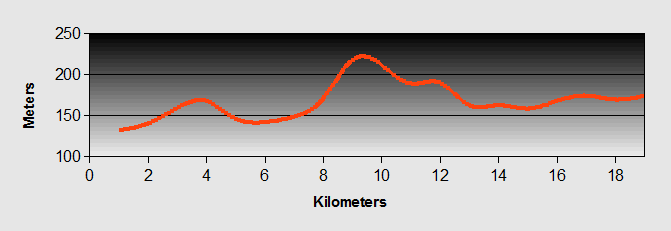
Cycle Cambodia - Pong Nam Ron to Pailin ride profile
To cycle Cambodia we would cross the border from Thailand just east of the small town of Pong Nam Ron a distance of about 25km which is included in the total distance noted above.
At 6.30am we were woken by loud knocking on the door and two of the
staff were there with our breakfast. Luckily we had kept the air-con on
all night to dry the washing so had slept in our PJ's. It was only fried
eggs, bread and coffee but it got us out of bed and ready to go by
7.30.
It was about 30km of level riding to the border at Ban Pakard with a
stop for puncture repair on the way. It is such a quiet, low key border
crossing. It's difficult to see where passport control is as there's no
queue. All of the movement was on foot, no vehicles crossed while we
were there.
On the Cambodian side there was a long queue of locals waiting for day
passes, but the only other person at the visa desk was the agent for the
bus passengers, collecting all their visas for them.
From here it was another 20kms to Pailin, the first town into Cambodia.
We weren't sure what the road conditions would be but this road was in
very good condition and the traffic was very light. Halfway there we had
the second puncture of the day and started to worry that the tyres were
getting ready for replacement. This will probably have to wait till we
get to Ho Chi Min City.
Pailin was a scruffy, cowboy town with little to endear it. We rode
around looking for somewhere to stay but could only find one guesthouse
which was pretty drab with questionably clean bed linen. By the evening
they seemed to fill most of the rooms. The next task was to get some
Cambodian Riel but it was a bank holiday so both the banks were closed
and the ATM's only give US dollars.
Cycle Cambodia - Day 2 - Pailin to Battamburg
- Distance 89km
- Max Elevation 260m
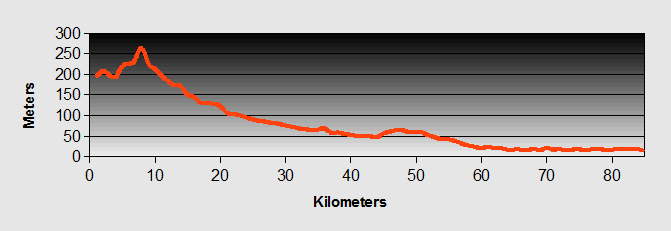
Cycle Cambodia - Pailin to Battamburg ride profile
Ride Description
We got up early again for our cycle Cambodia ride, mainly because the whole town seemed to get going
about 5.30am. As we loaded the bikes there were big black clouds above
our heads and as soon as we put a foot on the pedal it started to rain.
We headed for a little noodle shack just up the road and got there just
before the deluge. The noise of the rain on the tin roof was so loud as
to render talking impossible and the shutters had to be closed so we sat
in the near darkness eating our noodles. It was served with a generous
helping of meat which was so tough it was impossible to chew. The dog
under the table made short work of it though.
As we sat there a motorcyclist ran into a lady pedestrian on the road
outside. She was knocked to the ground and couldn't get up. Karen felt
she wouldn't be much help as hardly anyone here spoke English. Two
burly young men hauled her to her feet but she fell straight down again.
So they repeated the whole process. Realising she wasn't going to stand
up one of them lifted her in his arms like a baby, jumped on to the
back of a motorbike and they drove off to the clinic just up the hill.
Once the rain stopped we could continue our cycle Cambodia ride, with just a slight climb out
of Pailin and then a really long almost imperceptible downhill of about
40km. We were averaging about 24kph and with hardly any traffic. It was
hard work having to wave and shout 'hello' to all the children. Each
small house we passed had several children sitting or playing in the
shade who all shouted and waved to us.
We had read horror stories about this road to Battambang which, until
early 2012, was still unsurfaced and turned to a quagmire every time it
rained heavily. Now though the whole length has good smooth tarmac and
the people who live along it now have much easier journeys. Every inch
of every vehicle is utilised for freight or passengers and usually both,
with unbelievable numbers of passengers sat on top of the cabs, along
the sides and on the tailgates of the pick-ups.
This western area was one of the last to be rid of the Kyhmer Rouge and
still has a few land-mine clearing projects. The farms are small,
subsistence level and poverty is obvious.
Approaching Battambang the traffic level increased and the roads into the city were confusing and not well signposted. Battambang is the second largest city in Cambodia and its centre is full of old french colonial buildings. It is a popular tourist destination with a rapidly expanding choice of hotels and guesthouses. We fancied a bit of luxury so booked into the newish King Fy hotel, on the riverside for the enormous sum of $20 a night.
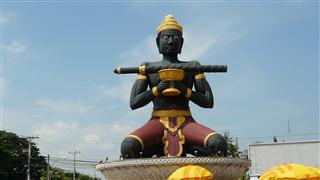
Today was the eve of the official mourning period following the death of the King's father in China. In various parts of the town small shrines decorated with his photograph and carpets for the prayers were being assembled.
Cycle Cambodia - Battambang - Day Off
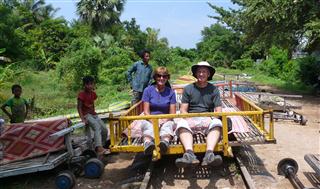
Leaving the bikes locked in the hotel garage, we booked a tuk-tuk and driver for the day. First stop was the Bamboo Train, about 2km out of town. There are several railway lines in Cambodia, built by the French but very poorly maintained since then. Local villagers utilised the lines to transport themselves and their produce on small buggies built from bamboo and powered with a petrol engine. Now, with greatly improved roads, the buggies are just a tourist attraction.
The 15 minute ride to a small track side village was fun although extremely bumpy due to the bent lines and the villagers benefit from the flow of tourists, providing refreshments, trinkets and tours around the village industries including a rice grinder and brick making factory.
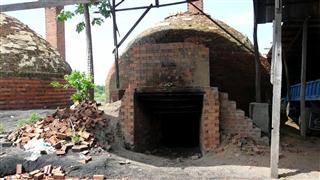
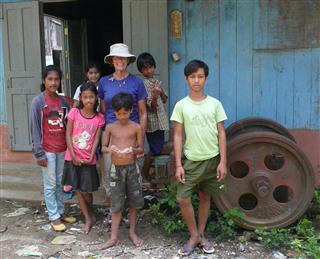
We attracted a fine gaggle of young tour guides, each anxious to get a small tip.
After that we drove to Phnom Sampeau, a temple built on a hill that was also the scene of some of the mass killings of Pol Pot's reign. The temple is on the top of a hill, with a stepped footpath but as it was our day off we hired two motorbikes and drivers to take us round. Even with the ride up to the hill tops it was still exhausting, climbing all the steps up to the temple, and then down to the caves where there are memorials to the victims of the killings. From the top of the rock the view was of a seemingly endless sea of green rice paddies stretching into infinity.
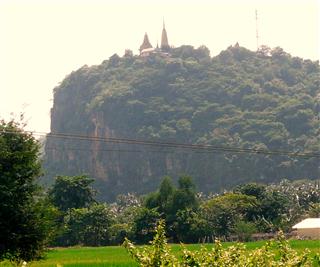
Cycle Cambodia - Day 3 - Battambang to Siem Reap
- Distance 123km
Ride Description
Today, our cycle Cambodia ride would be mainly by boat.
A boat runs every day from Battambang to Siem Reap and leaves at 7.00am.
The journey can be problematic in the dry season with low river water
levels, but In October, at the end of the rainy season, the water levels
are high. It cost $20 for us and $5 each for the bikes which traveled
on the roof.
The boat itself had seen better days and would probably not pass any GB safety inspection but the ride was so memorable.
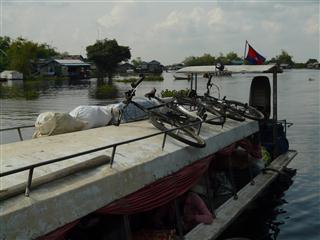
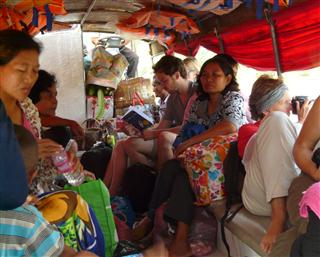
The passengers were a 50/50 mix of tourists and locals and on the six hour trip we stopped many times to drop off and pick up both goods and passengers.
Many times there was no jetty and one or two family members would paddle out in a canoe to collect a passenger or pick up a parcel.
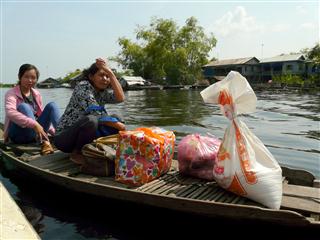
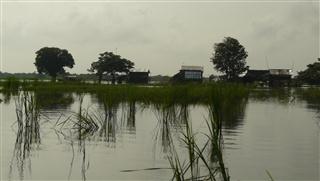
The homes along the river are built on stilts above the water with access only by boat.
Many people live on boats and the children paddle over in a canoe to the shop to buy treats. There was one 'comfort stop' at a small cafe on stilts over the water. The toilet was a cubicle with a round hole in the floor down to the waters below.
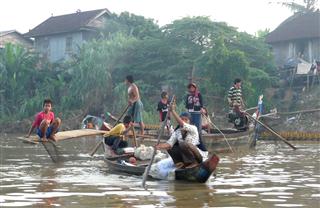
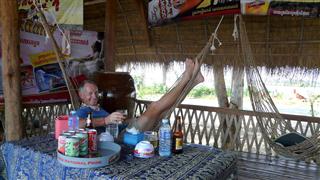
The port at Siem Reap is 11km from the town. Our cycle Cambodia ride continued on road, which was unsurfaced at first and rough from the recent rain but eventually reached tarmac. Along the roadside were restaurants on stilts over the water. There were individual dining areas all furnished with a low table, a carpet to sit on and a hammock to snooze in.
In Siem Reap we found yet another lovely guesthouse called Villa Brak
Sovann with newly decorated rooms, a restaurant and cheap beer. It is
the home and business of a lovely couple, Loy and Sovann and their four
young children.
The youngest, nicknamed Tin tin kept us constantly amused as he played in the bar area which doubled as their living room.
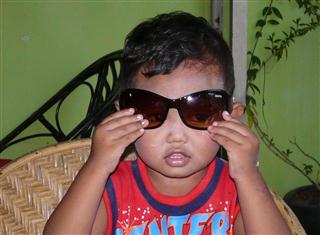
Cycle Cambodia - Siem Reap - 3 days off
On our first evening we joined two other couples who were staying in the
same accommodation for a meal in the town centre. It was a shock at
first to see how commercialised it is here, with countless questionable
'massage' shops and drugs and women freely available on the streets,
such a contrast to the quiet villages of rural Cambodia. But markets are
led by customers.....
Over the following three days we visited the modern and well presented
Angkor museum and had two days touring the innumerable ancient ruins.
The first day was by bike and we tried to catch the sunrise behind
Angkor Wat. Having underestimated how long it would take to get there
and overestimated sunrise, we missed it by about 15 mins. This is one of
the most popular times to visit and the place was packed, despite being
only 5.45am. Actually it was a good time to visit because all the coach
parties soon departed and we were able to look round at one of the
quietest times.
The ruins here are truly amazing and deserve their Worldwide fame. A lot
of effort has and is still being put into preserving what is left and
preventing any further damage from trees and land subsidence. These
works were well underway in 1975 before Pol Pot took over and one of the
huge buildings had been partially demolished as it was collapsing. The
stones were all carefully labelled and recorded but his armies destroyed
all the records leaving the archaeologists with a massive 3-D jigsaw
puzzle once his regime was overthrown.
The second day we took the easier option and hired a tuk-tuk to see some of the more distant temples.
While we were there we also went to a cello concert at the Kantha Bopha
Children's hospital. The cellist is Beat Richner, a paediatrician who
has worked in Cambodia for over 30 years. He plays a few pieces and
talks about the work of the hospital every Saturday to help raise money
for the care of the children. 90% of the running costs have to be met by
donations. It made a big impression on us. If you are interested you
can read more about it here.
Cycle Cambodia - Day 4 - Siem Reap to Kampong Kdie
- Distance 65km
- Max Elevation flat
Ride Description
We were up early again for our cycle Cambodia ride and enjoyed some cool morning air. Heading east on NR 6 was good preparation for Phnom Penh with manic traffic around the market. Every conceivable form of transport and pedestrians all moving in random directions. Beyond there it all quietened down. The road was smooth and wide with a hard shoulder. Most of the traffic was motorbikes but every so often a fast tourist bus would shoot past accompanied by loud horn blaring.
The flat, straight road goes through endless villages. The area seems much more prosperous than further west with neatly tended houses and land and greater numbers of livestock. The cattle here are treated like royalty. Led to grazing, tethered in the shade, water carried to them to drink and in the afternoon taken to the pond for a wash and brush up.
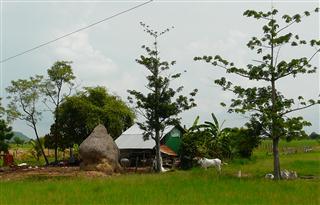
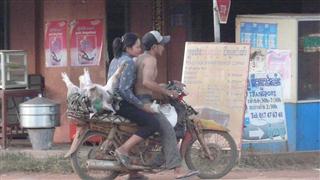
The pigs don't fare quite so well, transported around tied upside down on the back rack of the motorbike with their legs stuck in the air and a generous bunch of water hyacinth tied to their stomachs to keep them cool. Worst off are the birds, twenty to thirty live hens and ducks hung by their legs from the back rack swinging wildly with all the bumps and potholes.
Instead of all the large cars of Siem Reap there were ox-carts plodding and water buffalo cooling off in the ponds. At 11am the secondary school children set off home for lunch, all riding on bicycles in long snaking columns down the road. Each one wants a wave and a hello so by lunchtime we were hoarse.
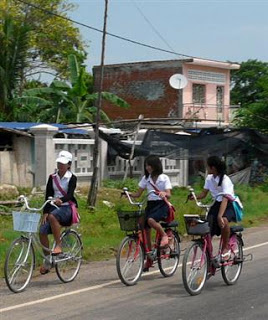
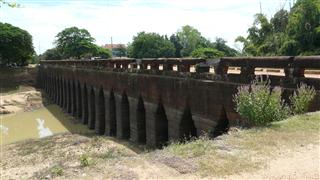
At 12.00 we arrived in Kampong Kdie, the cycle Cambodia ride taking us across the ancient and unique stone block bridge. At the riverside was a restaurant so we went in hoping for some food. The staff spoke no English and seemed reluctant to give us any. At that moment a young American couple came in who spoke fluent Cambodian. They were also turned away so they took us to another restaurant in the town and had lunch with us. Katie and Tim are from Philadelphia and are doing two years voluntary work with the American Peace Corps.
With their help we booked into a small guesthouse, 'the best in town'. It had an en-suite: the toilet flushed with a bucket, the basin tap didn't work and the u-bend was blocked, but the shower worked OK and cold water was just what the doctor ordered. The fan was very noisy and it was too hot to sleep much.
Cycle Cambodia - Day 5 - Kampong Kdie to Kampong Thom
- Distance 89km
Ride Description
The cycle Cambodia ride continued along the NR 6, flat, but with a slight head wind today. It was hotter today and we had to keep re-applying the suntan lotion as the copious sweating kept washing it off. The road was lined with fascination: groups of villagers threshing rice, spreading the grains out to dry in the sun, lines of stalls selling rice, steamed over charcoal fires sealed in bamboo stems, racks of river fish being smoked.....
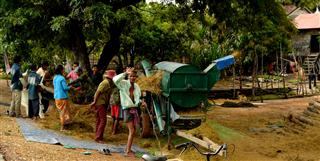
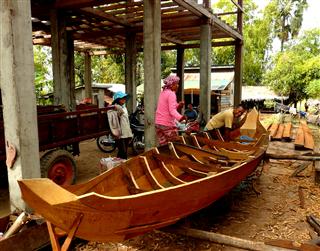
....boat builders producing traditional canoes, carpenters cutting huge hardwood beams with a two man saw.
Steve stopped to photograph the carpenters, propping his bike against a tree at the side of a pond. The bike rolled forwards and went handlebars first into the water, submerging his bar bag. This just happens to be the place where he keeps all his electronic equipment. Phone, solar charger, spare battery and camera charger all got dunked in the water. Amazingly, after some careful drying out, everything appears to function normally.
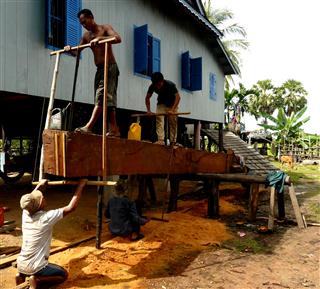
For lunch we stopped at a small roadside place. There was only one other
customer and amazingly he spoke English so again we had help to order
food. He lived in Kampong Thom, our evening destination, so gave us
information about all the hotels.
The afternoon section of our cycle Cambodia ride was less pleasant with increasing amounts of traffic.
The buses are the worst, particularly the smaller ones. They advertise
to tourists as 'fast and safe' but this applies only to the passengers,
not other road users, as they race along in the centre of the road
blaring their horns and forcing everyone else out of the way.
Cycle Cambodia - Day 6 - Kampong Thom to Skun
- Distance 95km
Ride Description
For most of the day the road was in a very poor state. The tarmac was very narrow and broken edged with a rough loose hard shoulder. There was more traffic and lots of large pot-holes so the riding was tense with frequent escapes onto the hard shoulder when potentially dangerous drivers tried to clear everything in their paths.
By mid-morning of our cycle Cambodia ride we had reached the village of Kakoah, famous for its
stone-carving. All along the road were hundreds of Buddhas, lions, and
dragons being fashioned from huge lumps of stone.
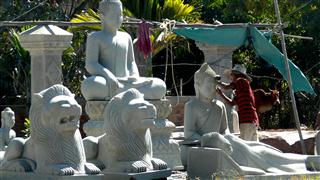
Again the heat was intense and we couldn't seem to drink enough to
replace the sweat. The towns and villages here seemed much poorer, there
was lots of rubbish and more water pollution. There were few places
serving food but on the outskirts of a particularly desolate and dirty
town there was a huge bus station with a restaurant.
Later we stopped at a rest area on the side of a river and sat on a
shady balcony overlooking the water drinking cold pineapple juice. Skun
was another transport hub so had a choice of guesthouses but none of
them were very good. One of them was almost certainly a brothel.
Cycle Cambodia - Day 7 - Skun to Phnom Penh
- Distance 85km
Ride Description
The first 30km of our cycle Cambodia ride today was smooth tarmac with a surfaced hard shoulder.
The traffic was light and there was plenty of trees for shade. This
lulled us onto a false sense of security, thinking as we were close to
the capital, surely the roads would be in good repair. Not likely, the
next 40km was some of the worst we have ridden since China.
The road is in the process of being widened and improved but it will be a
long time before this is completed. So where there is tarmac it is in a
poor state and several long sections are unsurfaced, narrow and very
rough with masses of traffic and clouds of dust. We alternated between
riding along the poorly surfaced road and the parallel track being
prepared for the new road.
By now we were covered in a fine layer of red dust. The approach to the
city was along the east bank of the Tonle Sap river through a largely
industrial and business area. Many modern hotels have been and are being
built along this part of the road, but we wanted accommodation in the
heart of the city so crossed over river on the Japanese built
"Friendship Bridge" and turning left along the riverside road. Reaching
the ferry port it was time for lunch in a Mexican restaurant.
Yearning for some luxury without breaking the bank we booked into the
'Cyclo Hotel' at the corner of Streets 172 and 23. This is run by a
French family and is used extensively by the French expat community and
business people. Promising a four night stay we managed to negotiate a
huge corner room with air con and private shower, cable TV, free wifi
and roof top spa for $25 per night. All this and croissant for
breakfast.
Cycle Cambodia - Days Off - Phnom Penh
The most important thing while in the capital was to get our Vietnam visas. We had trawled around the travel forums and Lonely Planet and got conflicting advice about how to do this but tried the travel agents and got a 3 month single entry visa in 48 hours (24 of those a Sunday) for $58 each which seemed a fair price.
The city centre doesn't have much in the way of tourist attractions except for the Royal palace, but that was closed because of the death of the King's Father. The architecture is a mix of old French colonial and modern drab concrete structures but the whole place throbs with a vibrant, colourful life with markets, street vendors, beggars, tuk-tuks, cyclos, motorbikes and pedestrians flowing seamlessly along it's arteries and veins.
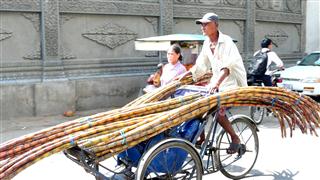
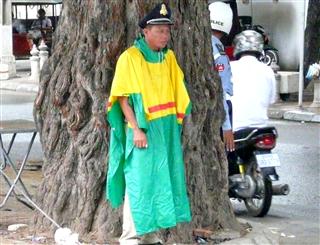
There are few traffic lights, all junctions are four way but no-body ever actually stops. At busy times the police try to control the traffic. They stand about as much chance as Canute did with the tide. The only way to get anybody to stop is to stand directly in front of them, so close that they can't squeeze sideways.
So the main 'tourist attractions' are the macabre Killing Fields of Choeung Ek and the Tuol Sleng museum, both of which bear witness to the genocide of Pol Pot's era when more than one in four of the population was exterminated. There are some truly chilling stories of the torture and killing of many hundreds of Cambodian people.
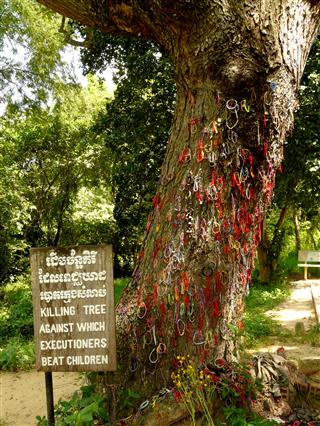
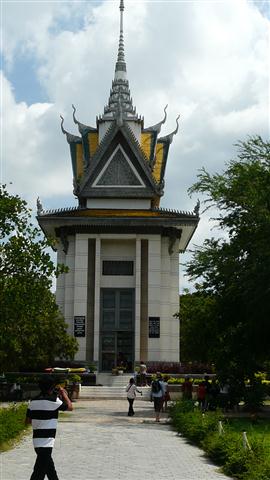
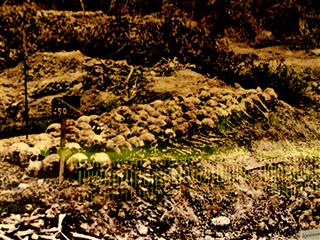
While here, we also had the opportunity to visit a good dentist. A badly needed clean and polish plus a cavity filling for Steve. Our cycle Cambodia ride had takenits toll and our tyres needed replacing. We managed to find two Schwalbe City road tyres and had them fitted at Grashopper cycles.
It was also time to relax, chill in the jacuzzi, eat good food and do a little shopping.
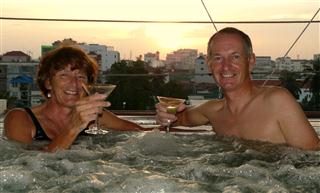
Cycle Cambodia - Day 8 - Phnom Penh to Takeo
- Distance 81km
- Max Elevation flat
Ride Description
After five nights at the Cyclo hotel we found it difficult to tear
ourselves away. Setting off at 7.30am we continued our cycle Cambodia ride along a surprisingly quiet road
and not nearly so threatening as on our arrival. Maybe we're getting
used to Cambodian driving. Passing the Independence monument we stopped
on the pavement to take a photo. It was already littered with various
cars and motorbikes but immediately a security guard came out and
gestured for us to move on.
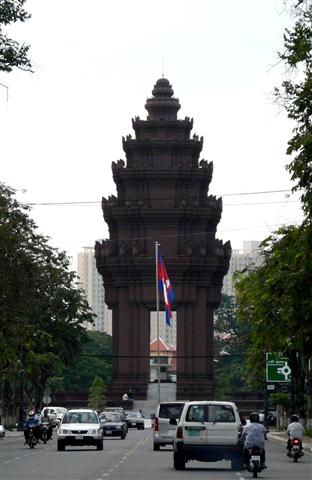
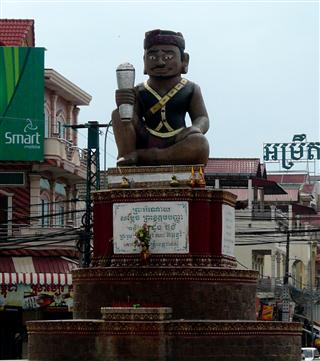
Heading south on NR 3 the traffic soon thinned out even more. The first town out of PP is Ta Khamau, on a tributary of the Mekong, with colourful boats on the banks. There was also an interesting statue, very like that of Battambang, in the town centre.
For this part of our cycle Cambodia ride the road was quieter as it headed south, with mainly motorbikes and some heavy but slow lorries carrying rock and sand. Each village along the road seems to specialise in a single product, with lots of roadside stalls all in competition with each other. There was the Jack Fruit town, Garden Plant town, Sausage town, Woven Basket town, Kebab town and Hammock town.
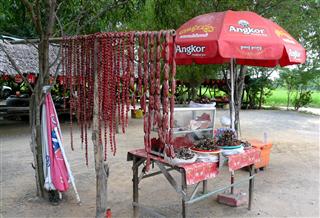
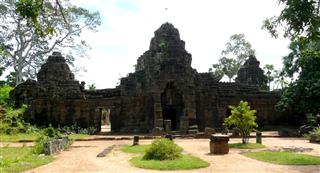
A turning on the right was signposted to 'Ta Prohm Tourist Site' so we went down for a look at another temple. It was 1km along a dirt road to a small village and a little man on a deckchair collecting $3 each admission. We thought as it was a way from the road there would be few tourists and no hassle. Rolling into the car park we were immediately in the clutches of a couple of girls who wanted us to buy incense sticks and flowers for the shrine who also offered watch the bikes.
With those two paid off, there was a crowd of others wanting to give
guided tours, sell more flowers and take us to other temples. It was
impossible to move without being approached by children asking for money
'to go to school'. To cap it all the guy selling the entrance tickets
tried to persuade us to give him the tickets back as we left so he could
sell them again!
It was hot again, with little shade but we made fast progress and
arrived in Takeo about 2.30pm. One of the bike tour companies in PP had
suggested a guesthouse which was OK but not amazing. But it was only $10
a night. It was quite a way out of the town so we ate in a little
outdoor restaurant down the road in a torrential thunderstorm.
Cycle Cambodia - Day 9 - Takeo to Kampot
- Distance 108km
- Max Elevation 52m
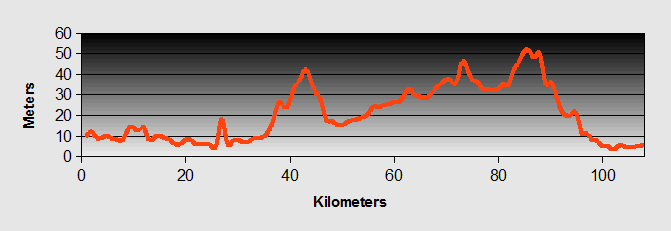
Cycle Cambodia - Takeo to Kampot ride profile
Ride Description
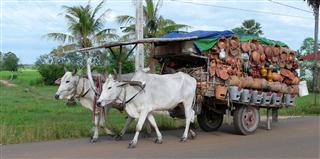
Rather than take the direct route to Kampot along NR3, for our cycle Cambodia ride we decided to head south on NR2 and take a minor road back to NR3 at Chiuk. This was fraught with potential problems as we could only get a basic map on the sat nav and none of the towns have name signs or road numbers.
NR 2 was well surfaced, the traffic mostly bikes and motorbikes. It is only a few kilometers from Vietnam and we were anxious not to miss our turning and end up at the border. After 20km we came to a small town, not shown on our map, and the turning that we were looking for. It too was smoothly surfaced and went through some pretty rural villages with cows tethered at the roadside and slow moving ox and pony carts.
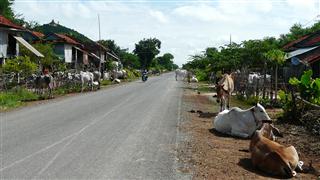
After 22km we found the next turning onto 133a which was just a red dirt track. It was just as smooth as a lot of the tarmac roads and there was hardly anyone else on it. We climbed slightly through some re-growing forest then dropped a little into a beautiful rice growing area with scattered farms and lots of trees. Life here seemed very slow and relaxed and everyone was friendly.
The last couple of kilometers into Chiuk was muddy and potholed by a
sudden increase in motor traffic. Stopping there for lunch we had
exactly the same meal as breakfast: rice, pork and cucumber and looked
forward longingly to something different in Kampot. It was still another
40km south on NR3 so we set ourselves the target of getting there in
under two hours. The road had a smooth hard shoulder and even though it
was hot we managed about 22kph.
There were still lots of school children to greet and a few motorbike
riders who slowed down to chat. A tuk-tuk driver tried to tempt us to
get a ride with him but we resisted. Steve retrieved a child's toy which
fell from another tuk-tuk and returned it to the delighted group of
Muslim mothers. One of them blew him a kiss.
Kampot is an old French Colonial port town which has retained a little
of its architectural heritage. Along the riverside are a few blocks of
old French shop houses, many of which have been renovated and made into
hotels and bars with the rest gradually moulding and rotting. We got a
room at the Soleil D'Or, another French run business near to the river
and booked in for 3 nights.
Cycle Cambodia - Kampot - Days off
This town has such a laid back and relaxed atmosphere that we did very
little on our two days off. Along the riverside there were four massive
uprooted trees which had been blown over in a storm two nights before.
We met an American lady, Maya, living in Mexico and traveling through
Asia on her own, who regaled us with tales of her vast past traveling
exploits.
On the first evening we were amazed to bump into Jean Claude, a
Frenchman who we met in Malaysia, now working at a hotel in the town.
The second evening we went on a sunset cruise up the river.
Unfortunately here was no sunset that night but everyone on the small
boat had such a good time chatting to each other and swapping travel
stories that it didn't matter. Afterwards we went to a sea food
restaurant on the riverside with an Australian couple from the boat and
Maya, to sample local pepper crab and fried shrimp (huge prawns).
Cycle Cambodia - Day 10 - Kampot to Kep
- Distance 35km
Ride Description
The cycle Cambodia route south out of Kampot is in a poor state with several unsurfaced sections and an early morning downpour had left lots of big puddles. Further on it was easier riding, smoother and less traffic. With such a short ride we arrived just before lunch at the famous crab market.
As it was Sunday it was very busy and vibrant with lots of Cambodians out for a Sunday treat, in mini-buses and small trucks.
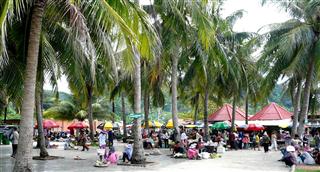
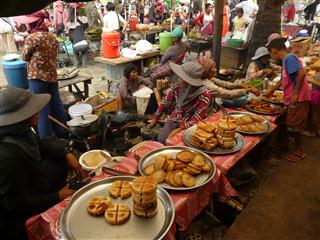
The stalls were doing a good trade selling fruit, preserved sea-food and trinkets while the food sellers had squid, prawns, fish and, of course, crabs.
Lunch was spent in a little restaurant in a shack at the waters edge, feasting on seafood.
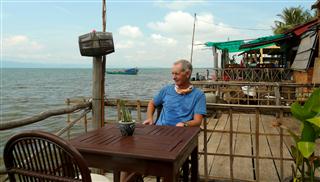
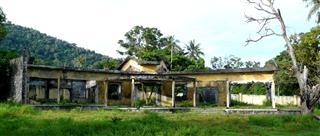
Afterwards we rode along the coast into Kep town, passing the ruins of many 1960's houses built by the French and abandoned in 1975, then ransacked by the Cambodians. The pace of development here is rapid, lots of infrastructure is being prepared, roads, sewers and walls ready for a massive increase in hotels, resorts and holiday homes.
Cycling Cambodia - Day 11 - Kep to Ha Tien
- Distance 38km
Ride Description
Today would be the last day of our cycle Cambodia ride.
We had read in a local guidebook about a track along the coast to the beach at Angoul which would cut about 10km off our cycle Cambodia route to the border. It started with a right turn just after the school onto a typical red dirt double track lane. After about 1km there was rougher track around the edge of salt pans. From there the track was just a footpath and very muddy in parts, needing us to get off to push over the worst bits.
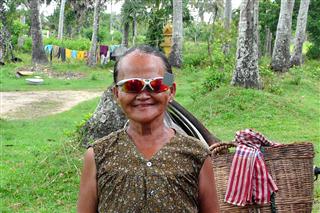
This joined another section of red dirt road, through a couple of fishing villages against the sea. We came to a fork in what was once again a footpath and went left which took us to some small thatch houses. The friendly ladies of the houses came out and chatted away to us in Cambodian though we understood nothing. One of them was fascinated by Karen's glasses and tried them on for size. They pointed us back to the fork and onto the right turn.
It was just as muddy, little used and continued over a bank between the
sea and another area of salt pans. This looked decidedly dangerous, with
parts washed away, so we headed inland and onto the road. Without a
detailed map we weren't quite sure where we were, but a sign to 'Ha Tien
Casino' reassured us as we knew this was at the border crossing. Just
before the border is a long section of unsurfaced road, busy with
traffic kicking up clouds of thick red dust.
The Cambodian border was simple and service was quick. Arriving at the
Vietnamese side we first had to fill in a health questionnaire. The
official did it for us, just ticking all the 'no' boxes to the questions
like 'do you have a fever' without even asking us. Then he demanded a
$1 fee. Moving on to the passport check we found that we were bottom of
the queue for the man behind the window. First were the bus tour group
organisers who appeared regularly with piles of passports from the bus
groups, then locals, then us. So even though it was not busy we had to
wait over an hour before the passports were returned. At least there was
no palm to grease.
From here it was just a short ride to the town of Ha Tien on the banks
of a river. We booked into a small guesthouse where the owner spoke
quite good English. We asked him about the ferries to the island of Phu
Quoc, our next destination. He advised us that it would be cheaper and
easier, with the bikes, to catch the slow car ferry rather than the
hydrofoil.
Follow our tour as we enter Vietnam, cycle through the Mekong Delta to Saigon and the Central Highlands.
Click here if you want to read about the ride through Thailand before our cycle Cambodia ride
or
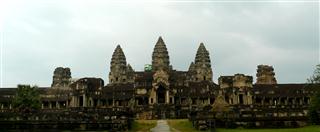
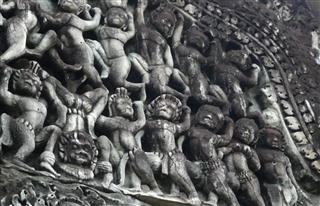
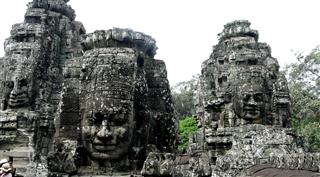
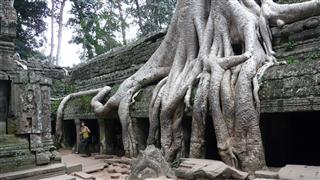
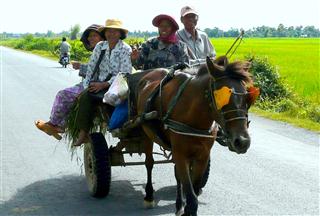
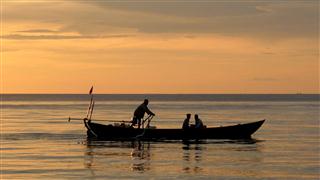
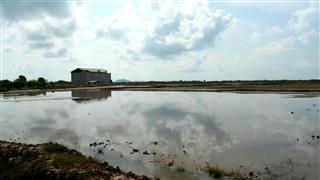
New! Comments
Have your say about what you just read! Leave me a comment in the box below.